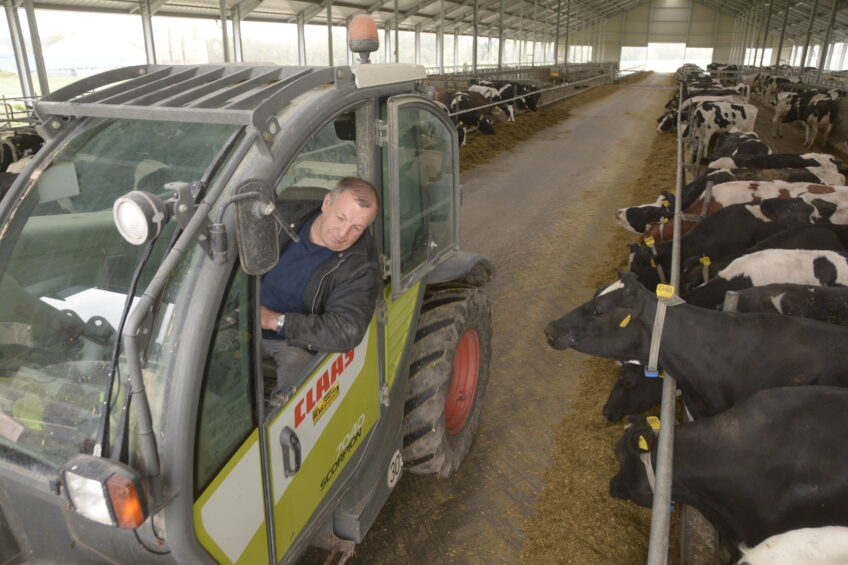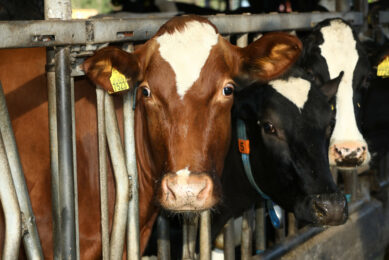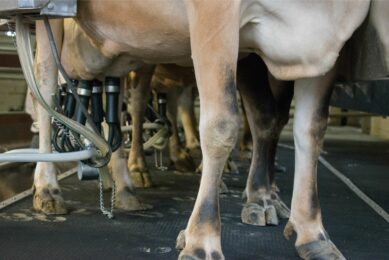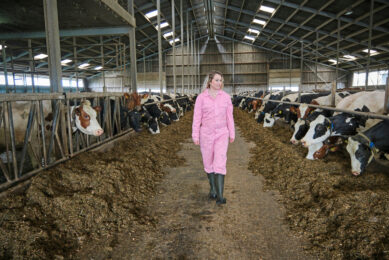Six entrepreneurs, 500 cows

Six German entrepreneurs have joined forces and built a new company with over 500 cows, 800 hectares of land and a manure digester installation. After six months the scale yields advantages. Further growth over the next few years is likely.
Situated in Bovenden, in the German district of Göttingen, Plesse Milch looks like a regular large dairy farm to the passer-by. There is a lot of activity going on, but the cows do not seem to mind much. This is no ordinary company, however; only six months ago the animals were housed at six different locations. Now, they have been ‘merged’ to one herd of over 500 animals. “The big move took place in November,” tells Herbert Hardege. He, together with Jürgen Wolff, is responsible for the daily management: Hardege is responsible for the cows and Wolff for the land. The other four entrepreneurs (Lars Beinhorn, Werner Beinhorn, Burkhardt Düvel and Thomas Vogel) each have specific tasks such as rearing young animals at their own locations.

PROFILE
Company: Jürgen Wolff (62) and Herbert Hardege (52) are two of the six entrepreneurs in Plesse Milch in Bovenden, in the German state of Lower Saxony. About 500 milking cows, 815 ha of land and a manure digester installation of 530 kW. Strategy: Optimise production, then scale up.
A total of 23 people work at the company, some temporarily, because of the construction of the company. It is operational, but clearly some things still need to be finished. The construction was conducted with the use of their own people and staff as much as possible. It is a huge project, especially for his small-scale area regarding livestock farming; three parallel barns have been built on the 7.5 ha building site.
Four groups of approximately 130 cows stay in the holding pen, the largest barn. This has a covered corridor connected to the barn with the waiting area, milking parlour and treatment stalls. Another corridor leads to the pen for dry and newly calved cows and the straw stalls for animals that need attention. In the distance, three typical pointed roofs of the digestion installation protrude above the immensely high stockpile of maize.
The plans to found a new company with six dairy farmers stems from 2006. They already knew each other through partnerships. Expansion was necessary for some of the farmers but proved to be impossible. Hardege: “And we all thought the same thing: how we couldn’t keep milking in those old barns until our retirements.” Thus the idea was born to put it all together and build a completely new company.
Limited liability
In 2010 the company Plesse Milch GmbH & Co (named after a nearby castle) was established. The legal company format limits the liability of the partners. It also simplifies partners joining or resigning. The individual entrepreneurs each have inserted assets into the joint company; the grounds are rented. The arrangements are fixed for twenty years. Partners can stop working, but the assets remain in the company for that period.
Legally, everything can be pinned down, but the entrepreneurs are aware that this cooperation also has a human aspect. This is why they hired a coaching agency. A mission statement has been drafted and individual and joint coaching sessions prepared the six farmers for this big step. A joint vision is of vital importance, emphasises Wolff: “All decisions have to comply with that.” The six partners strive to have weekly consultations on operational matters. They have not succeeded to do that thus far due to the bustle surrounding the finishing of the company, but they do realise that it is necessary.
In developing the structure of the company it was quickly decided to place a biogas installation. Germany has energy regulations for power from biogas with a guaranteed yield for twenty years. Companies that process their own manure, get a plus on the price. At the moment, the price is €0.22 per kWh. Only liquid and straw manure from the young cattle barns go in the digester. At first, 30 hectares of maize were also intended for the digester, but because the production is vastly higher than expected, the input is reduced.
Shared costs
An additional advantage of the biogas installation lies in the sharing of the cost. The biogas installation pays for 30% of the costs of manure storage. The total investment is estimated at €5,000 per stall. “Without biogas that would have been more,” said Hardege. The biogas installation would have cost the entrepreneurs approximately €1.3 million.
It takes one employee a few hours of work to feed the installation every day. Via a pump and underground piping, the manure from the collector of the barn goes directly to the digester. There the manure is mixed up with straw manure and left over feed from the barns. Soon, a second generator will be placed and the capacity will increase from 265 kW up to 530 kW. The entrepreneurs cannot explain the high gas production. “It is possible that the high production rate of the cows is related to it.” Because much less corn is needed, they save up to €50,000 in costs per year.
Interesting trading party
The new company has been up and running for about six months now. One of the goals was to work easier, and the two entrepreneurs consider this goal reached. The six entrepreneurs now have weekends off and are better able to plan their leisure time.
It does however take some getting used to: to allow for each other’s wishes, to plan vacations, and to manage personnel. They said goodbye to companies and people with whom they worked individually. Now, for instance, they work with a veterinarian specialised in larger companies. “This was not easy for everyone, but it is for the best.”
The entrepreneurs acknowledge the advantages of this scale; they are an interesting party when it comes to buying products and it is more efficient to work in groups. Another thing they have noticed is that this scale works as a catalyst. In the planning phase, the company added up to 550 ha; a few years later it has grown to 800 ha. “We can accomplish more, because we are bigger.”
The circumstances in this new barn are better than before, resulting in already increasing production after the stressful period for the cows. Udder health is good and fertility goes well with support of activity monitoring. Point of focus for the short term is calving management; there are still too many cows with calf disease and afterbirth problems. Meanwhile the feed regime during the dry period has been modified by providing two rations.
Expanding the company
The question for the near future is whether the entrepreneurial differences between the partners are going to play a role. The sum of six companies may be 500 cows, but this is not the same as one company that has grown to 500 cows. Sufficient entrepreneurial strength is needed to successfully develop the company. Hardege is capable and visionary enough to lead the way. He already dreams of expansion; the design took into account that the two holding barns can be mirrored. The space between the huge silage pit and the current barn is reserved for just that purpose. Growth becomes a lot cheaper, just like in the Netherlands, in an era without quota. Roughage is sufficiently available and disposal of manure is not a problem thanks to the manure digester. “There is however, more political and social resistance. If we choose the safe option, the barn might be there sooner than we think.”
Join 13,000+ subscribers
Subscribe to our newsletter to stay updated about all the need-to-know content in the dairy sector, two times a week.
















